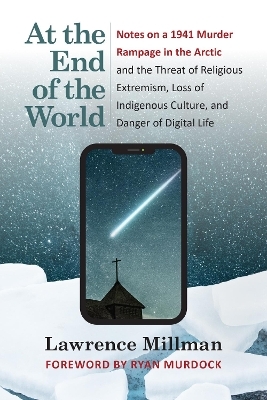
At the End of the World
Notes on a 1941 Murder Rampage in the Arctic and the Threat of Religious Extremism, Loss of Indigenous Culture, and Danger of Digital Life
Seiten
2023
Trinity University Press,U.S. (Verlag)
978-1-59534-998-9 (ISBN)
Trinity University Press,U.S. (Verlag)
978-1-59534-998-9 (ISBN)
An exploration of indigenous trauma, climate change, and digital culture in the shadow of a series of Inuit murders in Canada in 1941
In a remote corner of the Arctic in 1941, a meteor shower flashed across the sky for an unusually long time. Taking this to be a sign, one of the local Inuit proclaimed himself Jesus Christ. Another proclaimed himself God. Anyone who didn’t believe in them was Satan. Violence ensued.
At the End of the World isn’t just the remarkable story of a series of murders that occurred on the Belcher Islands, a group of wind-blasted rocks in Canada’s Hudson Bay. It’s also a starting place for a deeper cultural exploration. Against the backdrop of the murders, which highlight the fact that senseless violence in the name of religion is not a contemporary phenomenon and that a even people as seemingly peaceful as the Inuit can turn to chaos at the hands of one person’s delusion, Millman addresses the burgeoning dawn of the digital era, following the murders’ trail to show how our obsession with screens is not unlike a cult and offering a warning cry against the erosion of humanity and the destruction of the environment. The story becomes a confluence of the consequences of generational trauma, outside religious evangelism, systemic racism against indigenous people, the perilous passage from the natural to the digital world, and what it means to be human in a time of technological dominance and climate disasters.
At the End of the World, available for the first time in paperback, is not a straightforward tale of true crime but an examination of many of the issues that have become dominant in the global conversation. In snippets of reflection, Millman asks us to look north for answers to many of the questions we all hold, literally, in our hands.
In a remote corner of the Arctic in 1941, a meteor shower flashed across the sky for an unusually long time. Taking this to be a sign, one of the local Inuit proclaimed himself Jesus Christ. Another proclaimed himself God. Anyone who didn’t believe in them was Satan. Violence ensued.
At the End of the World isn’t just the remarkable story of a series of murders that occurred on the Belcher Islands, a group of wind-blasted rocks in Canada’s Hudson Bay. It’s also a starting place for a deeper cultural exploration. Against the backdrop of the murders, which highlight the fact that senseless violence in the name of religion is not a contemporary phenomenon and that a even people as seemingly peaceful as the Inuit can turn to chaos at the hands of one person’s delusion, Millman addresses the burgeoning dawn of the digital era, following the murders’ trail to show how our obsession with screens is not unlike a cult and offering a warning cry against the erosion of humanity and the destruction of the environment. The story becomes a confluence of the consequences of generational trauma, outside religious evangelism, systemic racism against indigenous people, the perilous passage from the natural to the digital world, and what it means to be human in a time of technological dominance and climate disasters.
At the End of the World, available for the first time in paperback, is not a straightforward tale of true crime but an examination of many of the issues that have become dominant in the global conversation. In snippets of reflection, Millman asks us to look north for answers to many of the questions we all hold, literally, in our hands.
Lawrence Millman is a writer, Arctic explorer, and mycologist who has made more than forty expeditions to the Arctic and subarctic. He has taught at the University of Iceland, the University of New Hampshire, Tufts University, and the University of Minnesota. His eighteen books include The Last Speaker of Bear, Last Places, At the End of the World, Fungipedia, Our Like Will Not Be There Again, Hiking to Siberia, Northern Latitudes, and Goodbye, Ice. He has received a Guggenheim Award, a Fulbright Fellowship, and a Lowell Thomas Award. When not on the road or in the bush, he lives in Cambridge, Massachusetts.
| Erscheinungsdatum | 08.03.2023 |
|---|---|
| Vorwort | Ryan Murdock |
| Zusatzinfo | Illustrations |
| Verlagsort | San Antonio |
| Sprache | englisch |
| Themenwelt | Geisteswissenschaften ► Religion / Theologie ► Weitere Religionen |
| ISBN-10 | 1-59534-998-7 / 1595349987 |
| ISBN-13 | 978-1-59534-998-9 / 9781595349989 |
| Zustand | Neuware |
| Haben Sie eine Frage zum Produkt? |
Mehr entdecken
aus dem Bereich
aus dem Bereich
archäologische Fakten und Fiktionen im Neuheidentum
Buch | Softcover (2023)
Verlag Anton Pustet
CHF 36,90


